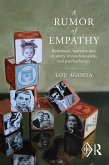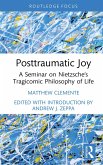Memories and Monsters (eBook, PDF)
Psychology, Trauma, and Narrative
Redaktion: Severson, Eric R.; Goodman, David M.
41,95 €
41,95 €
inkl. MwSt.
Sofort per Download lieferbar

21 °P sammeln
41,95 €
Als Download kaufen

41,95 €
inkl. MwSt.
Sofort per Download lieferbar

21 °P sammeln
Jetzt verschenken
Alle Infos zum eBook verschenken
41,95 €
inkl. MwSt.
Sofort per Download lieferbar
Alle Infos zum eBook verschenken

21 °P sammeln
Memories and Monsters (eBook, PDF)
Psychology, Trauma, and Narrative
Redaktion: Severson, Eric R.; Goodman, David M.
- Format: PDF
- Merkliste
- Auf die Merkliste
- Bewerten Bewerten
- Teilen
- Produkt teilen
- Produkterinnerung
- Produkterinnerung

Bitte loggen Sie sich zunächst in Ihr Kundenkonto ein oder registrieren Sie sich bei
bücher.de, um das eBook-Abo tolino select nutzen zu können.
Hier können Sie sich einloggen
Hier können Sie sich einloggen
Sie sind bereits eingeloggt. Klicken Sie auf 2. tolino select Abo, um fortzufahren.

Bitte loggen Sie sich zunächst in Ihr Kundenkonto ein oder registrieren Sie sich bei bücher.de, um das eBook-Abo tolino select nutzen zu können.
Memories and Monsters explores the nature of the monstrous or uncanny, and the way psychological trauma relates to memory and narration. This interdisciplinary book works on the borderland between psychology and philosophy, drawing from scholars in both fields who have helped mould the bourgeoning field of relational psychoanalysis and phenomenological and existential psychology.
- Geräte: PC
- mit Kopierschutz
- eBook Hilfe
- Größe: 5.28MB
Andere Kunden interessierten sich auch für
![Memories and Monsters (eBook, ePUB) Memories and Monsters (eBook, ePUB)]() Memories and Monsters (eBook, ePUB)41,95 €
Memories and Monsters (eBook, ePUB)41,95 €![Subjective Experience (eBook, PDF) Subjective Experience (eBook, PDF)]() Morris N. EagleSubjective Experience (eBook, PDF)33,95 €
Morris N. EagleSubjective Experience (eBook, PDF)33,95 €![A Rumor of Empathy (eBook, PDF) A Rumor of Empathy (eBook, PDF)]() Lou AgostaA Rumor of Empathy (eBook, PDF)46,95 €
Lou AgostaA Rumor of Empathy (eBook, PDF)46,95 €![Posttraumatic Joy (eBook, PDF) Posttraumatic Joy (eBook, PDF)]() Matthew ClementePosttraumatic Joy (eBook, PDF)21,95 €
Matthew ClementePosttraumatic Joy (eBook, PDF)21,95 €![Ethics and Attachment (eBook, PDF) Ethics and Attachment (eBook, PDF)]() Aner GovrinEthics and Attachment (eBook, PDF)37,95 €
Aner GovrinEthics and Attachment (eBook, PDF)37,95 €![The Suffering Stranger (eBook, PDF) The Suffering Stranger (eBook, PDF)]() Donna M. OrangeThe Suffering Stranger (eBook, PDF)47,95 €
Donna M. OrangeThe Suffering Stranger (eBook, PDF)47,95 €![Between Philosophy and Psychoanalysis (eBook, PDF) Between Philosophy and Psychoanalysis (eBook, PDF)]() Robert SamuelsBetween Philosophy and Psychoanalysis (eBook, PDF)35,95 €
Robert SamuelsBetween Philosophy and Psychoanalysis (eBook, PDF)35,95 €-
-
-
Memories and Monsters explores the nature of the monstrous or uncanny, and the way psychological trauma relates to memory and narration. This interdisciplinary book works on the borderland between psychology and philosophy, drawing from scholars in both fields who have helped mould the bourgeoning field of relational psychoanalysis and phenomenological and existential psychology.
Dieser Download kann aus rechtlichen Gründen nur mit Rechnungsadresse in A, B, BG, CY, CZ, D, DK, EW, E, FIN, F, GR, HR, H, IRL, I, LT, L, LR, M, NL, PL, P, R, S, SLO, SK ausgeliefert werden.
Produktdetails
- Produktdetails
- Verlag: Taylor & Francis eBooks
- Seitenzahl: 312
- Erscheinungstermin: 2. Januar 2018
- Englisch
- ISBN-13: 9781351660389
- Artikelnr.: 50745934
- Verlag: Taylor & Francis eBooks
- Seitenzahl: 312
- Erscheinungstermin: 2. Januar 2018
- Englisch
- ISBN-13: 9781351660389
- Artikelnr.: 50745934
- Herstellerkennzeichnung Die Herstellerinformationen sind derzeit nicht verfügbar.
Eric R. Severson is a philosopher specializing in the work of Emmanuel Levinas. He is author of the books Levinas's Philosophy of Time (Duquesne University Press, 2013) and Scandalous Obligation (Beacon Hill Press, 2011), and editor of several volumes on ethics, philosophy of religion and psychology. He currently teaches philosophy at Seattle University. David M. Goodman is a licensed clinical psychologist, Associate Dean of Academic Affairs and Advising at the Woods College of Advancing Studies at Boston College, Director of the Psychology and the Other Institute, and a teaching associate at Harvard Medical School/Cambridge Hospital.
Introduction: listening to monsters
Eric R. Severson and David M. Goodman ; Chapter 1: Apocalyptic exceptionalism and existential particularity: the rise in popularity of dystopian myths and our immortal "other"
Paul Cantz ; Chapter 2: The Golem must live
the Golem must die: on the moral imperative of writing critical cultural histories of psychology
Philip Cushman; Chapter 3: The Golem and the decline of language and magic-or
why our machines disappoint
Joel Rosenberg; Chapter 4: Is loyalty really a virtue? Shame and the monstrous Other
Peter Shabad; Chapter 5: Toward a psychoanalysis of passion
Jerome A. Miller; Chapter 6: Living in the shadows of the past: German memory
trauma
and legacies of perpetration
Roger Frie; Chapter 7: Haunting and historicity
Jerome Veith; Chapter 8: Changing societal narratives
fighting "crimes against humanity"
Doris Brothers; Chapter 9: Positioning self and other: how psychiatric patients
psychiatric inmates
and mental health care professionals construct discursively their relationship to total institutions
Branca Telles Ribeiro and Diana Souza Pinto; Chapter 10: "I am not myself
but I am not an other": self-dissolution narrative in medical rehabilitation psychotherapy
Orin Segal; Chapter 11: The idealized "other": a reparative fiction
Amira Simha-Alpern; Chapter 12: Foucault and Derrida on interiority and the limits of psychoanalyzing sexuality and madness
Peter Capretto; Chapter 13: Beautiful troubling alterity: an intersubjective response to Nabokov's Lolita
Steven Huett and George Horton; Chapter 14: The music knows: grieving existential trauma in art
music
and psychoanalysis
Malcolm Owen Slavin
Eric R. Severson and David M. Goodman ; Chapter 1: Apocalyptic exceptionalism and existential particularity: the rise in popularity of dystopian myths and our immortal "other"
Paul Cantz ; Chapter 2: The Golem must live
the Golem must die: on the moral imperative of writing critical cultural histories of psychology
Philip Cushman; Chapter 3: The Golem and the decline of language and magic-or
why our machines disappoint
Joel Rosenberg; Chapter 4: Is loyalty really a virtue? Shame and the monstrous Other
Peter Shabad; Chapter 5: Toward a psychoanalysis of passion
Jerome A. Miller; Chapter 6: Living in the shadows of the past: German memory
trauma
and legacies of perpetration
Roger Frie; Chapter 7: Haunting and historicity
Jerome Veith; Chapter 8: Changing societal narratives
fighting "crimes against humanity"
Doris Brothers; Chapter 9: Positioning self and other: how psychiatric patients
psychiatric inmates
and mental health care professionals construct discursively their relationship to total institutions
Branca Telles Ribeiro and Diana Souza Pinto; Chapter 10: "I am not myself
but I am not an other": self-dissolution narrative in medical rehabilitation psychotherapy
Orin Segal; Chapter 11: The idealized "other": a reparative fiction
Amira Simha-Alpern; Chapter 12: Foucault and Derrida on interiority and the limits of psychoanalyzing sexuality and madness
Peter Capretto; Chapter 13: Beautiful troubling alterity: an intersubjective response to Nabokov's Lolita
Steven Huett and George Horton; Chapter 14: The music knows: grieving existential trauma in art
music
and psychoanalysis
Malcolm Owen Slavin
Introduction: listening to monsters
Eric R. Severson and David M. Goodman ; Chapter 1: Apocalyptic exceptionalism and existential particularity: the rise in popularity of dystopian myths and our immortal "other"
Paul Cantz ; Chapter 2: The Golem must live
the Golem must die: on the moral imperative of writing critical cultural histories of psychology
Philip Cushman; Chapter 3: The Golem and the decline of language and magic-or
why our machines disappoint
Joel Rosenberg; Chapter 4: Is loyalty really a virtue? Shame and the monstrous Other
Peter Shabad; Chapter 5: Toward a psychoanalysis of passion
Jerome A. Miller; Chapter 6: Living in the shadows of the past: German memory
trauma
and legacies of perpetration
Roger Frie; Chapter 7: Haunting and historicity
Jerome Veith; Chapter 8: Changing societal narratives
fighting "crimes against humanity"
Doris Brothers; Chapter 9: Positioning self and other: how psychiatric patients
psychiatric inmates
and mental health care professionals construct discursively their relationship to total institutions
Branca Telles Ribeiro and Diana Souza Pinto; Chapter 10: "I am not myself
but I am not an other": self-dissolution narrative in medical rehabilitation psychotherapy
Orin Segal; Chapter 11: The idealized "other": a reparative fiction
Amira Simha-Alpern; Chapter 12: Foucault and Derrida on interiority and the limits of psychoanalyzing sexuality and madness
Peter Capretto; Chapter 13: Beautiful troubling alterity: an intersubjective response to Nabokov's Lolita
Steven Huett and George Horton; Chapter 14: The music knows: grieving existential trauma in art
music
and psychoanalysis
Malcolm Owen Slavin
Eric R. Severson and David M. Goodman ; Chapter 1: Apocalyptic exceptionalism and existential particularity: the rise in popularity of dystopian myths and our immortal "other"
Paul Cantz ; Chapter 2: The Golem must live
the Golem must die: on the moral imperative of writing critical cultural histories of psychology
Philip Cushman; Chapter 3: The Golem and the decline of language and magic-or
why our machines disappoint
Joel Rosenberg; Chapter 4: Is loyalty really a virtue? Shame and the monstrous Other
Peter Shabad; Chapter 5: Toward a psychoanalysis of passion
Jerome A. Miller; Chapter 6: Living in the shadows of the past: German memory
trauma
and legacies of perpetration
Roger Frie; Chapter 7: Haunting and historicity
Jerome Veith; Chapter 8: Changing societal narratives
fighting "crimes against humanity"
Doris Brothers; Chapter 9: Positioning self and other: how psychiatric patients
psychiatric inmates
and mental health care professionals construct discursively their relationship to total institutions
Branca Telles Ribeiro and Diana Souza Pinto; Chapter 10: "I am not myself
but I am not an other": self-dissolution narrative in medical rehabilitation psychotherapy
Orin Segal; Chapter 11: The idealized "other": a reparative fiction
Amira Simha-Alpern; Chapter 12: Foucault and Derrida on interiority and the limits of psychoanalyzing sexuality and madness
Peter Capretto; Chapter 13: Beautiful troubling alterity: an intersubjective response to Nabokov's Lolita
Steven Huett and George Horton; Chapter 14: The music knows: grieving existential trauma in art
music
and psychoanalysis
Malcolm Owen Slavin







